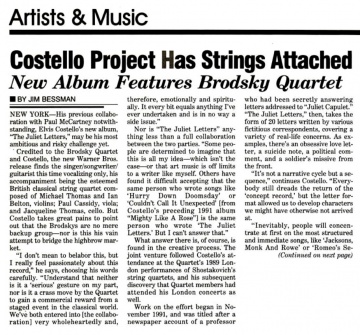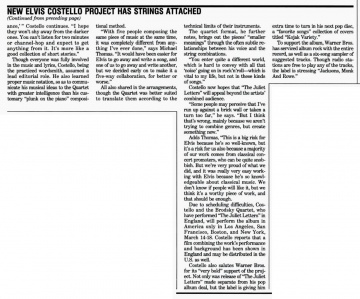Billboard, February 6, 1993: Difference between revisions
(update prev) |
(+text part 1) |
||
| Line 10: | Line 10: | ||
---- | ---- | ||
{{Bibliography text}} | {{Bibliography text}} | ||
NEW YORK — His previous collaboration with Paul McCartney not with-standing, Elvis Costello's new album, ''The Juliet Letters'', may be his most ambitious and risky challenge yet. | |||
Credited to the Brodsky Quartet and Costello, the new Warner Bros. release finds the singer/songwriter/ guitarist this time vocalizing only, his accompaniment being the esteemed British classical string quartet composed of Michael Thomas and Ian Belton, violins; Paul Cassidy, viola; and Jacqueline Thomas, cello. But Costello takes great pains to point out that the Brodskys are no mere backup group — nor is this his vain attempt to bridge the highbrow market. | |||
"I don't mean to belabor this, but I really feel passionately about this record," he says, choosing his words carefully. "Understand that neither is it a 'serious' gesture on my part, nor is it a crass move by the Quartet to gain a commercial reward from a staged event in the classical world. We've both entered into [the collaboration) very wholeheartedly and, therefore, emotionally and spiritually. It every bit equals anything I've ever undertaken and is in no way a side issue." | |||
Nor is ''The Juliet Letters'' anything less than a full collaboration between the two parties. "Some people are determined to imagine that this is all my idea — which isn't the case — or that art music is off limits to a writer like myself. Others have found it difficult accepting that the same person who wrote songs like 'Hurry Down Doomsday' or 'Couldn't Call It Unexpected' (from Costello's preceding 1991 album ''Mighty Like A Rose'') is the same person who wrote ''The Juliet Letters''. But I can't answer that." | |||
What answer there is, of course, is found in the creative process. The joint venture followed Costello's attendance at the Quartet's 1989 London performances of Shostakovich's string quartets, and his subsequent discovery that Quartet members had attended his London concerts as well. | |||
Work on the effort began in November 1991, and was titled after a newspaper account of a professor who had been secretly answering letters addressed to "Juliet Capulet." ''The Juliet Letters'', then, takes the form of 20 letters written by various fictitious correspondents, covering a variety of real-life concerns. As examples, there's an obsessive love letter, a suicide note, a political comment, and a soldier's missive from the front. | |||
"It's not a narrative cycle but a sequence," continues Costello. "Everybody still dreads the return of the 'concept record,' but the letter format allowed us to develop characters we might have otherwise not arrived at. | |||
"Inevitably, people will concentrate at first on the most structured and immediate songs, like 'Jacksons, Monk And Rowe' or 'Romeo's Se- | |||
(Continued on next page) | |||
Revision as of 17:15, 17 February 2016
|





